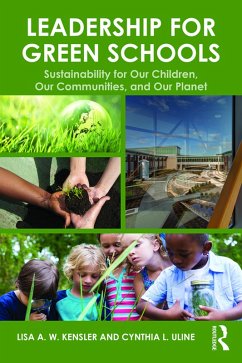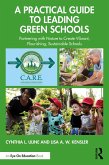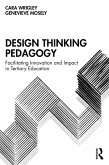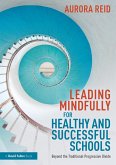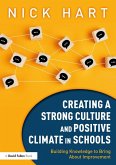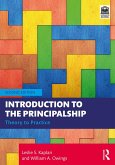Lisa A. W. Kensler, Cynthia Uline
Leadership for Green Schools (eBook, PDF)
Sustainability for Our Children, Our Communities, and Our Planet
40,95 €
40,95 €
inkl. MwSt.
Sofort per Download lieferbar

20 °P sammeln
40,95 €
Als Download kaufen

40,95 €
inkl. MwSt.
Sofort per Download lieferbar

20 °P sammeln
Jetzt verschenken
Alle Infos zum eBook verschenken
40,95 €
inkl. MwSt.
Sofort per Download lieferbar
Alle Infos zum eBook verschenken

20 °P sammeln
Lisa A. W. Kensler, Cynthia Uline
Leadership for Green Schools (eBook, PDF)
Sustainability for Our Children, Our Communities, and Our Planet
- Format: PDF
- Merkliste
- Auf die Merkliste
- Bewerten Bewerten
- Teilen
- Produkt teilen
- Produkterinnerung
- Produkterinnerung

Bitte loggen Sie sich zunächst in Ihr Kundenkonto ein oder registrieren Sie sich bei
bücher.de, um das eBook-Abo tolino select nutzen zu können.
Hier können Sie sich einloggen
Hier können Sie sich einloggen
Sie sind bereits eingeloggt. Klicken Sie auf 2. tolino select Abo, um fortzufahren.

Bitte loggen Sie sich zunächst in Ihr Kundenkonto ein oder registrieren Sie sich bei bücher.de, um das eBook-Abo tolino select nutzen zu können.
This book provides leaders with the tools to facilitate the design, leadership, and management of greener, more vibrant schools.
- Geräte: PC
- mit Kopierschutz
- eBook Hilfe
- Größe: 1.26MB
Andere Kunden interessierten sich auch für
![A Practical Guide to Leading Green Schools (eBook, PDF) A Practical Guide to Leading Green Schools (eBook, PDF)]() Cynthia L. UlineA Practical Guide to Leading Green Schools (eBook, PDF)31,95 €
Cynthia L. UlineA Practical Guide to Leading Green Schools (eBook, PDF)31,95 €![The Pocket Guide to Every Child Matters (eBook, PDF) The Pocket Guide to Every Child Matters (eBook, PDF)]() Rita CheminaisThe Pocket Guide to Every Child Matters (eBook, PDF)27,95 €
Rita CheminaisThe Pocket Guide to Every Child Matters (eBook, PDF)27,95 €![Design Thinking Pedagogy (eBook, PDF) Design Thinking Pedagogy (eBook, PDF)]() Cara WrigleyDesign Thinking Pedagogy (eBook, PDF)37,95 €
Cara WrigleyDesign Thinking Pedagogy (eBook, PDF)37,95 €![Leading Mindfully for Healthy and Successful Schools (eBook, PDF) Leading Mindfully for Healthy and Successful Schools (eBook, PDF)]() Aurora ReidLeading Mindfully for Healthy and Successful Schools (eBook, PDF)19,95 €
Aurora ReidLeading Mindfully for Healthy and Successful Schools (eBook, PDF)19,95 €![Creating a Strong Culture and Positive Climate in Schools (eBook, PDF) Creating a Strong Culture and Positive Climate in Schools (eBook, PDF)]() Nick HartCreating a Strong Culture and Positive Climate in Schools (eBook, PDF)17,95 €
Nick HartCreating a Strong Culture and Positive Climate in Schools (eBook, PDF)17,95 €![Global University President Leadership (eBook, PDF) Global University President Leadership (eBook, PDF)]() Hamish CoatesGlobal University President Leadership (eBook, PDF)37,95 €
Hamish CoatesGlobal University President Leadership (eBook, PDF)37,95 €![Introduction to the Principalship (eBook, PDF) Introduction to the Principalship (eBook, PDF)]() Leslie S. KaplanIntroduction to the Principalship (eBook, PDF)71,95 €
Leslie S. KaplanIntroduction to the Principalship (eBook, PDF)71,95 €-
-
-
This book provides leaders with the tools to facilitate the design, leadership, and management of greener, more vibrant schools.
Dieser Download kann aus rechtlichen Gründen nur mit Rechnungsadresse in A, B, BG, CY, CZ, D, DK, EW, E, FIN, F, GR, HR, H, IRL, I, LT, L, LR, M, NL, PL, P, R, S, SLO, SK ausgeliefert werden.
Produktdetails
- Produktdetails
- Verlag: Taylor & Francis eBooks
- Seitenzahl: 246
- Erscheinungstermin: 25. August 2016
- Englisch
- ISBN-13: 9781134737611
- Artikelnr.: 45698264
- Verlag: Taylor & Francis eBooks
- Seitenzahl: 246
- Erscheinungstermin: 25. August 2016
- Englisch
- ISBN-13: 9781134737611
- Artikelnr.: 45698264
- Herstellerkennzeichnung Die Herstellerinformationen sind derzeit nicht verfügbar.
Lisa A. W. Kensler is an Associate Professor of Educational Leadership at Auburn University. She received her EdD in Educational Leadership from Lehigh University in 2008 and a Master's degree in biology from Old Dominion University in 1996. Prior to returning to her childhood stomping grounds in Pennsylvania to earn her doctorate, Lisa spent a decade serving as a secondary science teacher and teacher leader in Norfolk, VA, Annapolis, MD, and St. Louis, MO. She taught in public schools and an independent school. In all cases, she worked to create the sort of classrooms students would choose to attend, even if their attendance was not required. She empowered students to lead in the classroom and beyond. She and her students were active in Jane Goodall's Roots & Shoots program, designing and leading initiatives for making the world a better place. Prior to her work as an educator, Lisa was an ecologist. Early in her career she worked for the Smithsonian's National Museum of Natural History and the U.S. Fish and Wildlife Service studying coral reefs, Chesapeake Bay, and the Great Lakes.
Lisa's research is grounded in her lifelong love of nature and her experience as an ecologist and educator. She uses her understanding of living systems to inform her research related to green schools and the leadership and learning required for transforming schools into more socially just, ecologically healthy, and economically viable communities. She has published articles and book chapters on democratic community, trust, systems thinking, and sustainability. She also integrates sustainability into the educational leadership courses that she teaches. Lisa was the 2013 winner of the Emily & Gerald Leischuck Graduate Teaching Award, an award that recognizes "faculty members who have consistently shown evidence of superior teaching excellence. These individuals have gone above and beyond the call of duty by engaging their students in the classroom and instilling a love for life-long learning."
Cynthia L. Uline is a Professor Emeritus of Educational Leadership at San Diego State University. Cynthia received her PhD in Educational Administration from the Pennsylvania State University in 1995 and a Masters degree in Special Education from Syracuse University in 1979. Cynthia previously served on faculty at the Ohio State University, where she was an assistant and associate professor of Educational Administration from 1995 to 2005. Cynthia also served as a classroom teacher, teacher leader, state education agency administrator, and an educational consultant working with school districts, community agencies, city governments, state agencies, and governors' offices, always seeking to facilitate meaningful partnerships on behalf of students and their families. Cynthia currently directs SDSU's National Center for the 21st Century Schoolhouse http://go.sdsu.edu/education/schoolhouse/ The Center supports the planning and design of learner-centered schools through communication, research, and training. Over seven years, the Center delivered a fully online advanced certificate program in educational facility planning, with students representing 34 states and 5 countries. Developed in partnership with the Association for Learning Environments (formerly CEFPI), the Advanced Academy for Learning Spaces continues to provide training in the key knowledge and skills central to the design, construction, and maintenance of learner-centered school facilities.
Cynthia's research explores the influence of built learning environments on students' learning, as well as the roles leaders, teachers, and the public play in shaping these learning spaces. Her current research considers the potential of green schools as student-centered, ecologically responsive, and economically viable places for learning. She has published articles related to leadership for learning, leadership preparation, and the improvement of social and physical learning environments in journals such as Educational Administration Quarterly, Teacher College Record, Journal of Educational Administration, Journal of School Leadership, International Journal of Leadership in Education, Leading and Managing, Journal of Research and Development in Education, Educational Leadership, and Educational Technology. This is Cynthia's third co-authored book.
Lisa's research is grounded in her lifelong love of nature and her experience as an ecologist and educator. She uses her understanding of living systems to inform her research related to green schools and the leadership and learning required for transforming schools into more socially just, ecologically healthy, and economically viable communities. She has published articles and book chapters on democratic community, trust, systems thinking, and sustainability. She also integrates sustainability into the educational leadership courses that she teaches. Lisa was the 2013 winner of the Emily & Gerald Leischuck Graduate Teaching Award, an award that recognizes "faculty members who have consistently shown evidence of superior teaching excellence. These individuals have gone above and beyond the call of duty by engaging their students in the classroom and instilling a love for life-long learning."
Cynthia L. Uline is a Professor Emeritus of Educational Leadership at San Diego State University. Cynthia received her PhD in Educational Administration from the Pennsylvania State University in 1995 and a Masters degree in Special Education from Syracuse University in 1979. Cynthia previously served on faculty at the Ohio State University, where she was an assistant and associate professor of Educational Administration from 1995 to 2005. Cynthia also served as a classroom teacher, teacher leader, state education agency administrator, and an educational consultant working with school districts, community agencies, city governments, state agencies, and governors' offices, always seeking to facilitate meaningful partnerships on behalf of students and their families. Cynthia currently directs SDSU's National Center for the 21st Century Schoolhouse http://go.sdsu.edu/education/schoolhouse/ The Center supports the planning and design of learner-centered schools through communication, research, and training. Over seven years, the Center delivered a fully online advanced certificate program in educational facility planning, with students representing 34 states and 5 countries. Developed in partnership with the Association for Learning Environments (formerly CEFPI), the Advanced Academy for Learning Spaces continues to provide training in the key knowledge and skills central to the design, construction, and maintenance of learner-centered school facilities.
Cynthia's research explores the influence of built learning environments on students' learning, as well as the roles leaders, teachers, and the public play in shaping these learning spaces. Her current research considers the potential of green schools as student-centered, ecologically responsive, and economically viable places for learning. She has published articles related to leadership for learning, leadership preparation, and the improvement of social and physical learning environments in journals such as Educational Administration Quarterly, Teacher College Record, Journal of Educational Administration, Journal of School Leadership, International Journal of Leadership in Education, Leading and Managing, Journal of Research and Development in Education, Educational Leadership, and Educational Technology. This is Cynthia's third co-authored book.
Preface
Acknowledgements
CHAPTER 1: Introduction - Leading Schools with a Green Frame of Mind
PART I: The DNA of Whole School Sustainability
CHAPTER 2: In the Best Interests of Children
CHAPTER 3: Design Principles for Whole School Sustainability
CHAPTER 4: Greening Your School's Vision
PART II: Healthy Ecosystems for Learning
CHAPTER 5: Place, Community, and Partnerships
CHAPTER 6: Green School Buildings as Dynamic Learning Environments
CHAPTER 7: Operations and Maintenance for Whole School Sustainability
PART III: Meaningful, Purposeful, Engaged Learning
CHAPTER 8: For the Love of Learning
CHAPTER 9: Innovative Teaching in Green Schools
CHAPTER 10: Green School Networks, Recognition Programs, and Resources
Tania McKey
INDEX
Acknowledgements
CHAPTER 1: Introduction - Leading Schools with a Green Frame of Mind
PART I: The DNA of Whole School Sustainability
CHAPTER 2: In the Best Interests of Children
CHAPTER 3: Design Principles for Whole School Sustainability
CHAPTER 4: Greening Your School's Vision
PART II: Healthy Ecosystems for Learning
CHAPTER 5: Place, Community, and Partnerships
CHAPTER 6: Green School Buildings as Dynamic Learning Environments
CHAPTER 7: Operations and Maintenance for Whole School Sustainability
PART III: Meaningful, Purposeful, Engaged Learning
CHAPTER 8: For the Love of Learning
CHAPTER 9: Innovative Teaching in Green Schools
CHAPTER 10: Green School Networks, Recognition Programs, and Resources
Tania McKey
INDEX
Preface
Acknowledgements
CHAPTER 1: Introduction - Leading Schools with a Green Frame of Mind
PART I: The DNA of Whole School Sustainability
CHAPTER 2: In the Best Interests of Children
CHAPTER 3: Design Principles for Whole School Sustainability
CHAPTER 4: Greening Your School's Vision
PART II: Healthy Ecosystems for Learning
CHAPTER 5: Place, Community, and Partnerships
CHAPTER 6: Green School Buildings as Dynamic Learning Environments
CHAPTER 7: Operations and Maintenance for Whole School Sustainability
PART III: Meaningful, Purposeful, Engaged Learning
CHAPTER 8: For the Love of Learning
CHAPTER 9: Innovative Teaching in Green Schools
CHAPTER 10: Green School Networks, Recognition Programs, and Resources
Tania McKey
INDEX
Acknowledgements
CHAPTER 1: Introduction - Leading Schools with a Green Frame of Mind
PART I: The DNA of Whole School Sustainability
CHAPTER 2: In the Best Interests of Children
CHAPTER 3: Design Principles for Whole School Sustainability
CHAPTER 4: Greening Your School's Vision
PART II: Healthy Ecosystems for Learning
CHAPTER 5: Place, Community, and Partnerships
CHAPTER 6: Green School Buildings as Dynamic Learning Environments
CHAPTER 7: Operations and Maintenance for Whole School Sustainability
PART III: Meaningful, Purposeful, Engaged Learning
CHAPTER 8: For the Love of Learning
CHAPTER 9: Innovative Teaching in Green Schools
CHAPTER 10: Green School Networks, Recognition Programs, and Resources
Tania McKey
INDEX
